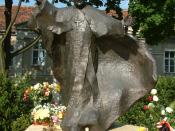What do Buddhism and Christianity teach about the significance, purpose and value of human life?
BUDDHISM
' The concern of Buddhism is with man rather than with the material universe. The phenomenal world is held to be without substance and to be in a constant condition of flux. Man himself is no less impermanent than the material world.'* þ Human life is subject to Anicca, the law of impermanence. This means that nothing ever stays the same
To be born human is a rare opportunity. Buddhists take this notion so seriously that a story was written for the sole purpose of illustrating it. It is called 'The Turtle and The Yoke'. A turtle is described, swimming around in the ocean, popping up for air every thousand years or so. It is claimed that the chance of being incarnated human are the same as that of the turtle putting his head through the yoke (which also floats around the ocean) on one of his trips to the top.
It follows, therefore, that to waste it is to waste numberless lives spent trying to gain this precious rebirth and also the chance of enlightenment.
The law of Karma says: All actions will entail consequences in the next life, so a Buddhist's freedom could be said to be somewhat compromised. This law means that, to be reincarnated human, you must live a near-perfect life. Any wrong doing on our part is foolish, because the condition experienced in present existence is regarded as having been caused by past deeds. It is beneficial, therefore, to use the golden opportunity wisely, as you are unlikely ever to get another 'crack at the apple'.
Buddhism and therefore human life is 'a quest to free us and the world from suffering and to promote happiness.'
CHRISTIANITY
'Human life...


